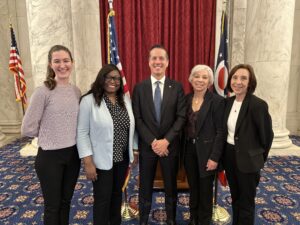Encouraging lawmakers to pass legislation and promote policies that positively affect rheumatologists, rheumatology care teams and those living with rheumatic disease is one of the most impactful ways the ACR advances its mission. The role of advocacy has never been more critical than in recent months, when we have seen an unprecedented number of executive orders and legislative actions that affect our specialty. The ACR tracks these developments and advocates on behalf of rheumatology through communication with federal and state legislators, regulatory agencies and the judicial branch.
The ACR is fortunate to have a skilled and experienced advocacy team, comprising staff and volunteer members, working on its behalf. Team members translate the key issues and guide us to the optimal path, allowing the ACR’s voice to be heard at national and local levels. This month’s column focuses on the broad ways in which the ACR approaches our advocacy efforts.
The D.C. Office
The ACR’s Washington, D.C., office enables the College to be front and center, interacting in real time with the latest events occurring within our government. Through this office, our advocacy team participates in congressional hearings and meetings with members of Congress and their staff. These events allow the ACR to educate lawmakers on the impact of proposed policies on the rheumatology community, suggest policy solutions to issues brought to our attention by members, and share the priorities important to rheumatologists, rheumatology professionals and patients.
Partners in advocacy
Much of the ACR’s advocacy success comes from working together with like-minded partners. For example, the ACR joined with more than 300 other organizations as part of the Ad Hoc Group for Medical Research to emphasize the importance of investment in the National Institutes of Health. The ACR co-convened the Underwater Biosimilars Coalition to fix the reimbursement formula for medications given in physician offices. Similarly, the ACR co-founded the Alliance for Transparent and Affordable Prescriptions to educate state and national officials about the activities of, and encourage reform of, pharmacy benefit managers (PBMs).
Government Affairs Committee
The Government Affairs Committee (GAC) plays a critical role in developing effective liaisons with members of Congress and organizations concerned with public policy aspects of healthcare delivery and healthcare financing. Leaders on the GAC also help guide the ACR’s advocacy efforts and prioritize the many policy issues that affect our members and specialty.



